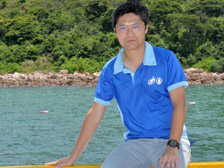Coral crusaders overcome challenges
September 14, 2014
A group of divers with disabilities is helping the government to conduct the annual check on the health of Hong Kong’s coral reefs, while finding personal fulfilment along the way.
In the morning sun, a group of people in diving gear is preparing to venture into the fascinating underwater world. But they are no ordinary divers, as they include those with disabilities.
One of them is Toby Yip, a quadriplegic diver who has reached a depth of 12 metres and continues to enjoy his hobby with the help of volunteers.
The Agriculture, Fisheries & Conservation Department co-ordinates the Hong Kong Reef Check – an annual survey of corals in the territory - and this year, Mr Yip is helping the International Association of Hand-in-hand Divers to take part in the exercise.
Mr Yip used to be a lifeguard. He was seriously injured in a diving accident, but refuses to let that dampen his passion for the sport. He recalled the first time he took the plunge following his accident in 2003.
“It is a whole new world underwater. I’m able to move freely and feel just like an able-bodied diver,” he said. Three volunteers support Mr Yip on a dive, while he uses his elbows to propel himself through the water.
Social inclusion
Mr Yip was elected chairman of the association last year and has been rallying its members to participate in the reef check.
More than 10 members - including three divers with disabilities - were chosen to carry out a site survey in waters east of Sharp Island. Mr Yip believes that because diving can be enjoyed by anyone, regardless of physical ability, the reef check is a good example of an activity that promotes social inclusion for people with disabilities.
The association’s secretary Daniel Yau lives with the effects of polio, but that hasn’t stopped him from diving. He has been a certified instructor for more than a decade and has taken part in the reef check for six years. Mr Yau joined the group to encourage others with disabilities to experience the joy of diving.
Mr Yau says the weightlessness underwater enables him to move freely and it is the only place where he feels it does not matter if you are able-bodied or disabled. He sees the reef check as a chance for divers to give back, too.
“It’s the diving community’s civic responsibility,” he said.
Agriculture, Fisheries & Conservation Department Senior Marine Conservation Officer Chow Wing-kuen says reef checking requires good teamwork.
He has noticed that teams which include divers with disabilities cooperate and communicate better with each other and are more skilled at maintaining buoyancy to avoid damaging the coral.
Encouraging signs
Agriculture, Fisheries & Conservation officials have been coordinating the annual coral survey in Hong Kong since 2000 with the help of volunteer divers. Back then, only 15 diving teams joined the reef check, but that has jumped to 63 this year.
Mr Chow sees the rising volunteer numbers as an encouraging sign that more people are becoming aware of the need to protect Hong Kong’s marine life.
Corals grow slowly and are home to a wide range of marine life, but passing vessels equipped with anchors and chains often damage or destroy them.
Signs warning sailors not to anchor in reefs were placed in waters around Sharp Island 12 years ago. Mr Chow says that since the “No Anchoring” signs were put up, there has been an increase in live coral in those areas.
“Damaged coral has also shown signs of recovery,” he said.
Armed with data the volunteer divers collect, the Government’s conservation experts will analyse the health of Hong Kong’s coral reefs and release their results by the end of the year.

Shoal shield: Agriculture, Fisheries & Conservation Department Senior Marine Conservation Officer Chow Wing-kuen says signs warning sailors not to anchor in reefs have helped protect the coral.
Link:
http://www.news.gov.hk/en/categories/environment/html/2014/09/20140912_144607.shtml?pickList=topstories